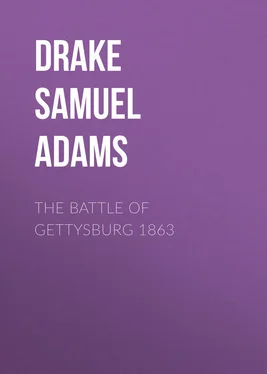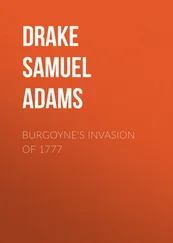Samuel Drake - The Battle of Gettysburg 1863
Здесь есть возможность читать онлайн «Samuel Drake - The Battle of Gettysburg 1863» — ознакомительный отрывок электронной книги совершенно бесплатно, а после прочтения отрывка купить полную версию. В некоторых случаях можно слушать аудио, скачать через торрент в формате fb2 и присутствует краткое содержание. Жанр: foreign_antique, foreign_prose, на английском языке. Описание произведения, (предисловие) а так же отзывы посетителей доступны на портале библиотеки ЛибКат.
- Название:The Battle of Gettysburg 1863
- Автор:
- Жанр:
- Год:неизвестен
- ISBN:нет данных
- Рейтинг книги:5 / 5. Голосов: 1
-
Избранное:Добавить в избранное
- Отзывы:
-
Ваша оценка:
- 100
- 1
- 2
- 3
- 4
- 5
The Battle of Gettysburg 1863: краткое содержание, описание и аннотация
Предлагаем к чтению аннотацию, описание, краткое содержание или предисловие (зависит от того, что написал сам автор книги «The Battle of Gettysburg 1863»). Если вы не нашли необходимую информацию о книге — напишите в комментариях, мы постараемся отыскать её.
The Battle of Gettysburg 1863 — читать онлайн ознакомительный отрывок
Ниже представлен текст книги, разбитый по страницам. Система сохранения места последней прочитанной страницы, позволяет с удобством читать онлайн бесплатно книгу «The Battle of Gettysburg 1863», без необходимости каждый раз заново искать на чём Вы остановились. Поставьте закладку, и сможете в любой момент перейти на страницу, на которой закончили чтение.
Интервал:
Закладка:
Hooker's Plan.
This order of march threw the left wing out as far as Boonsborough and Middletown, with Buford's cavalry division watching the passes by which the enemy would have to defile, should he think of making an attack from that flank. 21 21 So long as these passes were securely held, Lee would be shut up in his valley.
The rest of the army was halted, for the moment, around Frederick. The plan of operations, as first fixed, did not lack in boldness or originality. It was to follow Lee up the Cumberland Valley with two corps, numbering twenty thousand men, while the rest of the army should continue its march toward the enemy on the east side of South Mountain, but within supporting distance. As this would be doing just what Lee 22 22 Open to serious objections; but then, so are all plans. Tied down by his orders, Hooker would have taken some risks for the sake of some great gains. By closing every avenue of escape, it would have ensured Lee's utter ruin, provided he could have been as badly beaten as at Gettysburg.
had most reason to dread, it would seem most in accordance with the rules of war. At any rate, it initiated a vigorously aggressive campaign.
At this critical moment the Union army was, most unexpectedly, deprived of its head.
Hooker is thwarted.
In its pursuit of Lee this army had been much hampered by divided counsels, when, if ever united counsels were imperatively called for, now was the time. Worse still, it had too many commanders, both civil and military. The President, the Cabinet, the General-in-Chief (Halleck), and even some others, in addition to the actual commander, not to speak of the newspapers, had all taken turns in advising or suggesting what should, or what should not, be done. United action, sincere and generous co-operation, as between government and army, were therefore unattainable here. The government did not trust its general: the general respected the generalship of the Cabinet most when it was silent. Nobody in authority seemed willing to grant Hooker what he asked for, let it be ever so reasonable, or permit him to carry out his own plans unobstructed, were they ever so promising or brilliant. He could not get the fifteen or twenty thousand soldiers who were then dawdling about the camps at Baltimore, Washington, and Alexandria. He was brusquely snubbed when he asked for leave to break up the post at Harper's Ferry, when by doing so ten thousand good troops would have been freed to act against the enemy's line of retreat.
Harmony being impossible, Lee seemed likely to triumph through the dissensions of his enemies.
And leaves the Army.
Mortified at finding himself thus distrusted and overruled, Hooker threw up the command on the 27th, and on the 28th General Meade succeeded him. So suddenly was the change brought about, that when the officer bearing the order awakened Meade out of a sound sleep at midnight, he thought he was being put in arrest.
Spirit of the Army.
It is asserted by those who had the best means of knowing – indeed, it is difficult to see how it could be otherwise – that the army had lost faith in Hooker, and that the men were asking of each other, "Are we going to have another Chancellorsville?" Be that as it may, there were few better soldiers in that army than Meade; none, perhaps, so capable of uniting it at this particular juncture, when unity was so all-important and yet so lamentably deficient. This was the third general the army had known within six months, and the seventh since its formation. It was truly the graveyard of generals; and each of the disgraced commanders had his following. If, under these conditions, the Army of the Potomac could still maintain its efficiency unimpaired, it must have been made of different stuff from most armies.
It was not that the Union soldiers feared to meet Lee's veterans. Lee might beat the generals, but the soldiers – never! Yet it can hardly be doubted that repeated defeat had more or less unsettled their faith in their leaders, if not in themselves; since even the gods themselves struggle in vain against stupidity. 23 23 This feeling was so well understood at Washington that a report was spread among the soldiers that McClellan, their old commander, was again leading them, and the report certainly served its purpose.
General Meade.
If the new appointment did not silence all jealousies among the generals, or infuse great enthusiasm into the rank and file, – and we are bound to admit that Meade's was not a name to conjure with, – it is difficult to see how a better selection could have been made, all things considered. In point of fact, there was no one of commanding ability to appoint; but every man in the army felt that Meade would do his best, and that Meade at his best would not fall far behind the best in the field.
Meade could not become the idol of his soldiers, like Lee, because he was not gifted by nature with that personal magnetism which attracts men without their knowing why; but he could and did command unhesitating obedience and respect.
Best-disciplined Army.
In point of discipline, however, the Union army was vastly the superior of its adversary, and that counts for much; and in spite of some friction here and there, like a well-oiled machine the army was now again in motion, with a cool head and steady hand to guide it on. But as no machine is stronger than its weakest part, it remained to be seen how this one would bear the strain.
Thus a triumphant and advancing enemy was being followed by a beaten and not over-confident one, its wounds scarcely healed, 24 24 The army was not up to its highest point of efficiency. It had just lost fifty-eight regiments by expiration of service. This circumstance was known to Lee. The proportion of veterans was not so great as in the Confederate army, or the character of the new enlistments as high as in 1861 and 1862.
not much stronger than its opponent, and led by a general new to his place, against the greatest captain of the Confederacy. How could the situation fail to impose caution upon a general so fully and so recently impressed with the consequences of taking a false step? Meade's every move shows that from the beginning this thought was uppermost in his mind.
With the effects of Lee's simple presence thus laid before us, it is entirely safe to ask what should have stopped this general from dictating his own terms of peace, either in Philadelphia or Baltimore, provided he could first beat the Union army in Pennsylvania?
IV
REYNOLDS
Meade's Problem
The problem presented to Meade's mind, on taking command, was this: What are the enemy's plans, and where shall I strike him? He knew that part of Lee's army was at Chambersburg, part at Carlisle, and part at York. Was it Lee's purpose to concentrate his army upon the detachment at York or upon that at Carlisle, or would he draw these two detachments back into the Cumberland Valley, there to play a merely defensive game? Should the junction be at Carlisle, it would mean an attack on Harrisburg: if at York, or at some point between the main body and York, it would indicate an advance in force toward Philadelphia, Baltimore, or Washington. As all these things were possible, all must be duly weighed and guarded against. With a wily, brave, and confident enemy before him, Meade did not find himself on a bed of roses, truly; and he may well be pardoned the remark attributed to him when ordered to take the command, that he was being led to execution.
Meade needed no soothsayer to tell him that if Lee crossed the mountains, it would be because he meant to fight his way toward his object through every obstacle.
What was that object?
In answering this question the political considerations must be first weighed. In short, the purpose – the great purpose – of the invasion must be penetrated. That being done, the military problem would easily solve itself.
Читать дальшеИнтервал:
Закладка:
Похожие книги на «The Battle of Gettysburg 1863»
Представляем Вашему вниманию похожие книги на «The Battle of Gettysburg 1863» списком для выбора. Мы отобрали схожую по названию и смыслу литературу в надежде предоставить читателям больше вариантов отыскать новые, интересные, ещё непрочитанные произведения.
Обсуждение, отзывы о книге «The Battle of Gettysburg 1863» и просто собственные мнения читателей. Оставьте ваши комментарии, напишите, что Вы думаете о произведении, его смысле или главных героях. Укажите что конкретно понравилось, а что нет, и почему Вы так считаете.












